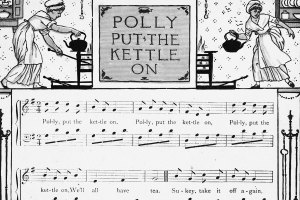Our 50 Funniest Facts About History
- Brooklyn Dodgers fans, 1949
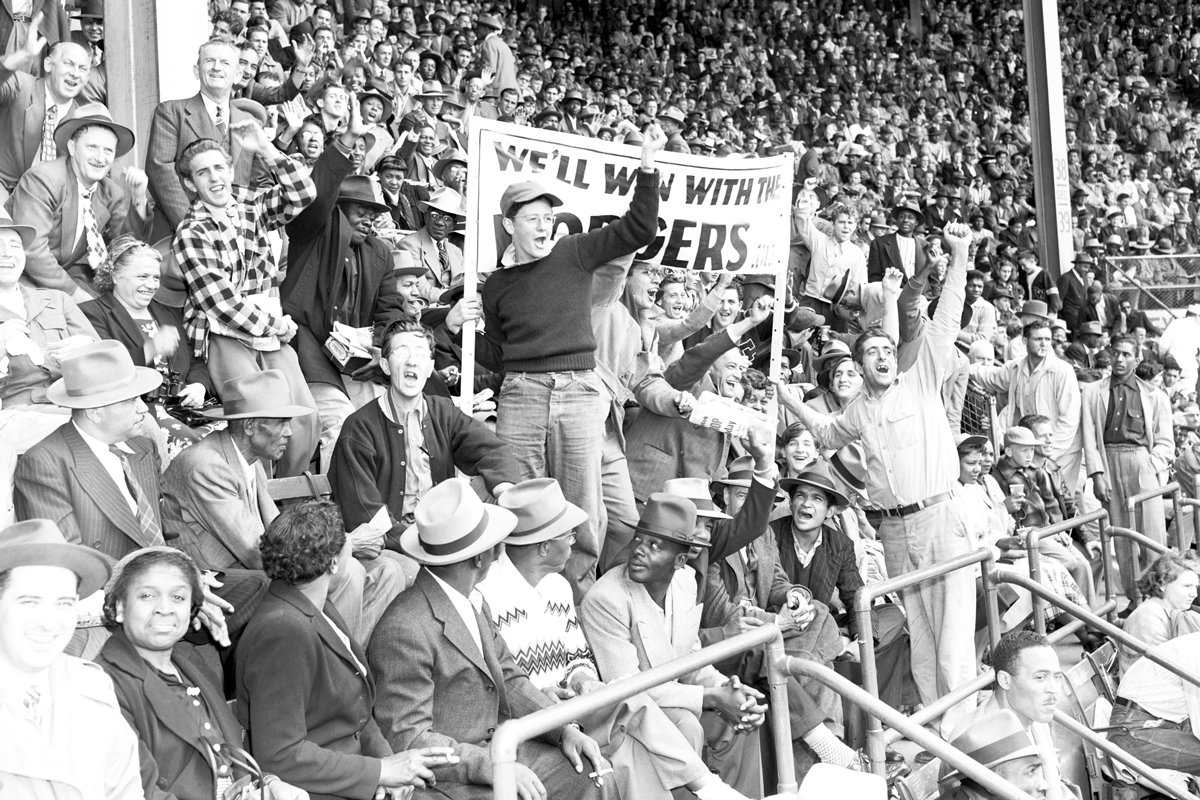
Author Bennett Kleinman
July 15, 2025
Love it?28
For all of the somber and mundane events that have occurred throughout human history, others are absurd enough to make you laugh out loud. This includes amusing tales such as one of history’s greatest generals getting attacked by rabbits, bizarre phobias and famous fallouts, and the strange bathroom habits of one U.S. president. So, if you’re looking to broaden your knowledge and have a good chuckle in the process, read on for 50 of the funniest facts we’ve featured on History Facts.
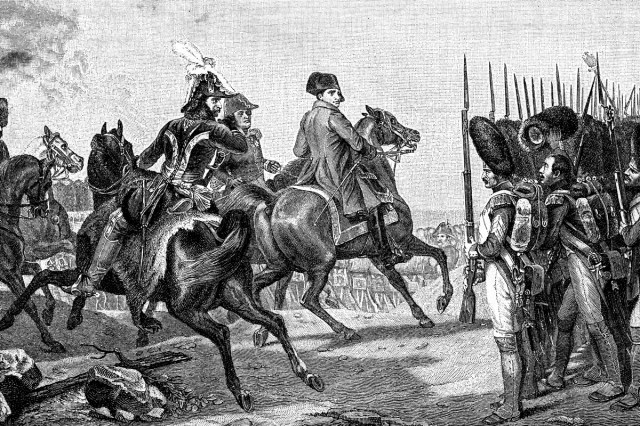
1. Napoleon was attacked (and defeated) by a horde of rabbits.
In one of history’s most shocking upsets, the emperor of the French was attacked by a horde of fluffy bunnies. The coup took place in July 1807 as Napoleon and his coterie celebrated a victory with a traditional rabbit hunt. Rather than run away, however, the bunnies began swarming Napoleon and his men. Though amusing at first, the situation quickly overwhelmed some of Europe’s foremost military strategists.
2. Andrew Jackson’s parrot was kicked out of his funeral for swearing.
It’s odd enough that President Andrew Jackson had an African grey parrot named Poll, and stranger still that the bird was kicked out of Jackson’s funeral for foul language. As one attendee observed, “Before the sermon and while the crowd was gathering, a wicked parrot that was a household pet got excited and commenced swearing so loud and long as to disturb the people and had to be carried from the house.”
You may also like
More from our network

3. The first woman in space forgot her toothbrush.
The first woman in space, Valentina Tereshkova, went without a toothbrush during her three days aboard the Vostok-6 spacecraft in 1963. To be fair, it wasn’t her fault: Mission control was actually in charge of packing the essentials, as the pioneering cosmonaut had other, presumably more scientific, things to focus on.
4. John Steinbeck's dog ate the first draft of "Of Mice and Men."
In 1936, John Steinbeck, already a successful author, was knee-deep in what eventually became Of Mice and Men. Then, a "minor tragedy stalked," Steinbeck wrote. "My setter pup [Toby], left alone one night, made confetti of about half of my ms. [manuscript] book. Two months work to do over again. ... There was no other draft." Fortunately, Toby's drastic edits proved but a temporary obstacle in the classic novel's path to completion.
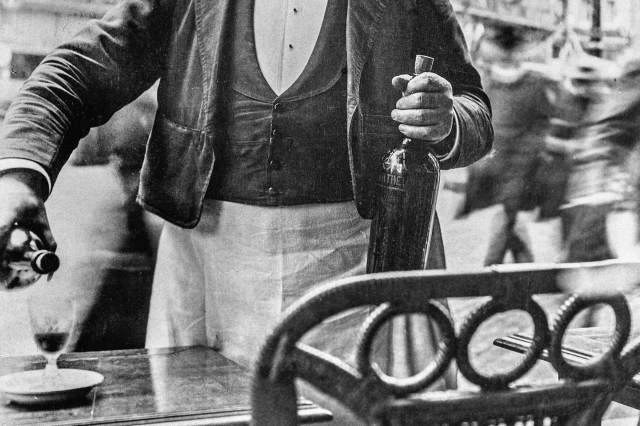
5. French waiters once went on strike for the right to grow mustaches.
In 1907, one of the more unusual strikes in France’s history unfolded. Better wages and working conditions were at stake, but so was something unexpected: the right to grow a mustache. The facial hair was at its peak popularity, but servers were forced to be clean-shaven. After 16 days, the waiters returned to work. They did not get their desired one day off per week, but a fairer pay structure was in place — as were their mustaches.
6. In 1932, Australia declared “war” on emus.
In 1932, a drought in Australia caused some 20,000 emus to move inland, disrupting farmers’ crops. The government sent in World War I veterans to assist the beleaguered farmers, and though they were outfitted with machine guns, they soon found themselves overwhelmed by their flightless foes. The birds emerged victorious in what’s now known as the Great Emu War, and they still thrive Down Under.

7. The U.S. used potatoes to attack a submarine during World War II.
Everyone’s favorite tuber took a break from being boiled, mashed, and stuck in a stew on April 5, 1943, when the crew of the USS O’Bannon was alarmed to see a Japanese submarine approaching. The ship was eventually close enough to its target for sailors to begin throwing objects at it — including, for lack of a better option, potatoes recovered from their deck lockers.
8. Lyndon B. Johnson liked to conduct meetings in the bathroom.
Lyndon B. Johnson was known for his untraditional tactics, which included conducting meetings while seated on the toilet. While some advisers would turn away in order to give the president privacy, Johnson would invite them to come closer so he could hear them better. LBJ treated other private facilities as meeting rooms as well — he was known to have aides stand just outside the shower, and he kept the conversation going while drying himself off afterward.
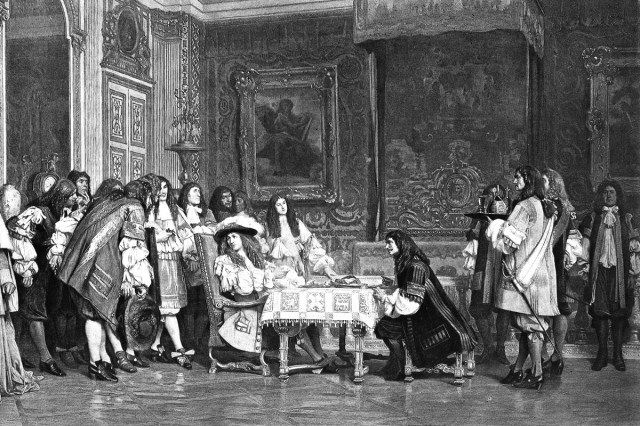
9. King Louis XIV reportedly owned 413 beds.
France's King Louis XIV embraced opulence to a historic degree throughout his reign. Case in point: The Sun King, as he was known, reportedly owned no fewer than 413 beds, which were considered status symbols at the time. Lavish beds at Versailles and other palaces were frequently used by the king for official business, and he would sprawl out atop the gilded linens during these stately meetings.
10. On April 18, 1930, the BBC announced, “There is no news.”
On April 18, 1930, nothing at all newsworthy occurred — at least according to the BBC. At the start of its regular news broadcast at 8:45 p.m., the BBC announced, “Good evening. Today is Good Friday. There is no news.” This unexpected declaration was followed by 15 minutes of piano music, before the radio station resumed its broadcast of Wagner’s opera Parsifal.
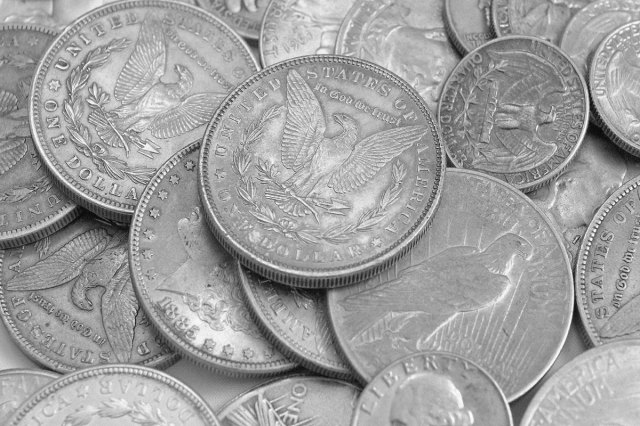
11. The eagle once depicted on U.S. coins was a real eagle named Peter.
The eagle seen on early U.S. coins was a real creature with a surprisingly common name: Peter. In a rather patriotic confluence of events, none other than an eagle took residence at the U.S. Mint in the 1830s, where he became a companion and mascot. Historians believe the eagle featured on the silver dollar was based on this beloved bird.
12. “LOL” used to be an acronym for “little old lady.”
Long before anyone laughed out loud on the internet, “LOL” was in use by virtue of a different phrase: “little old lady.” The acronym was popularized in the 1960s by San Francisco Chronicle columnist Herb Caen, who used it in many of his works. In his 1960 book Only in San Francisco, for instance, he described an outfit that included a tricorn hat topped with a bird as the “regalia of the authentic LOL.”

13. The Greek mathematician Pythagoras had a phobia of beans.
Pythagoras, the namesake of the Pythagorean theorem, was a highly influential early Greek philosopher, and a major inspiration for the likes of Aristotle and Plato. He was also a notorious hater of beans — specifically fava beans, also known as broad beans — and he strictly forbade his followers, the Pythagoreans, from coming into contact with the legumes.
14. Thomas Jefferson and John Adams stole a piece of Shakespeare’s chair.
In 1786, Thomas Jefferson and John Adams took a weeklong tour of England, and one of their first stops was the house where Shakespeare was born in Stratford-upon-Avon. Among the many relics at the house was the Bard's own chair, where the poet and playwright supposedly sat and wrote his great works. When the founding fathers left, they sliced off a piece of the chair to take home as a souvenir.
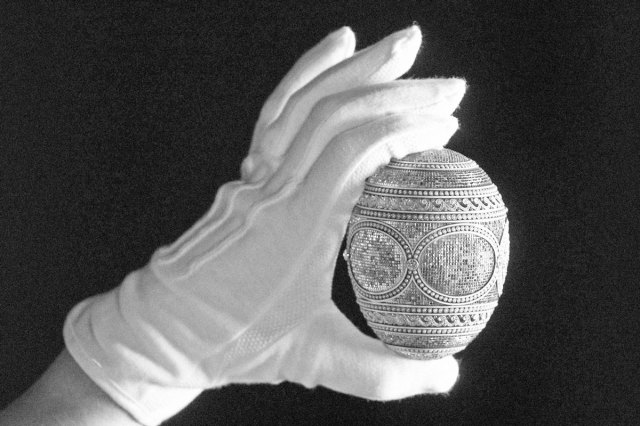
15. The creator of Fabergé eggs once made a Fabergé potato.
You’re probably familiar with Fabergé eggs, most of which were made for the Romanov family in their last few decades as Russian rulers. Fabergé didn’t just make eggs, however, and among all his intricate and ornate treasures, one unexpected subject stands out: a potato, just under 4 inches long, crafted in a realistic, irregular shape.
16. Hans Christian Andersen ruined his friendship with Charles Dickens by overstaying his welcome.
British novelist Charles Dickens and Danish fairy-tale writer Hans Christian Andersen were close pals for years, but their relationship quickly went south in 1857, when Andersen visited Dickens for what was supposed to be two weeks, but stretched on for five. After his departure, Dickens left a note on the mirror in the guest room: “Hans Andersen slept in this room for five weeks — which seemed to the family AGES.”
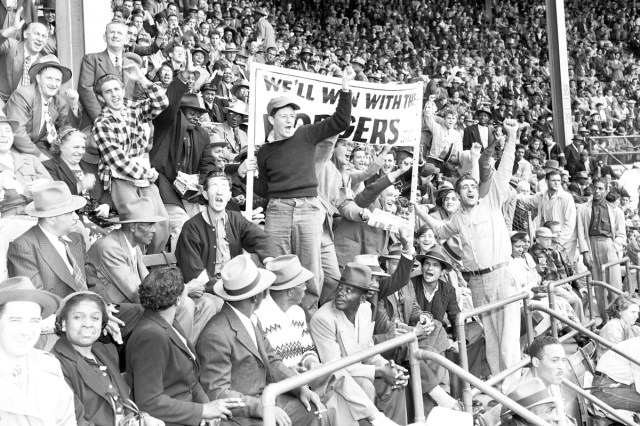
17. The “Take Me Out to the Ball Game” songwriters had never seen a baseball game.
“Take Me Out to the Ball Game” is one of the most recognizable songs in American history, written in 1908 by Jack Norworth and Albert Von Tilzer. You would think this legendary anthem came from a diehard baseball fan, but the truth is that neither of the songwriters had ever even been to a baseball game. The idea for the song came to Norworth not while he was sitting in the stands, but instead, of all places, on the New York City subway.
18. A woman named “Diot Coke” was born in the Middle Ages.
Roughly 600 years before a certain sugar-free soda was created, a newborn entered the world with a most bubbly name: Diot Coke. Historian George Redmonds of the British National Archives happened upon Ms. Coke while researching 14th-century names. He suggests her first name was a diminutive version of “Dionisia,” a once-popular name that evolved into “Denise,” while her last name was a corruption of “Cook.”

19. A pirate once attacked a ship and stole the crew's hats instead of treasure.
Not every ship targeted by pirates was carrying high-value goods. Often, ransacking a vessel was just a means to run errands — picking up rum, food, or other supplies. Captain Benjamin Hornigold’s crew had a pretty short shopping list when they boarded a sloop off the coast of Honduras one day. One passenger recalled, “They did us no further injury than the taking most of our hats from us.” The crew had gotten very drunk the previous night and thrown their hats overboard, and simply needed replacements.
20. Michelangelo’s David was censored by Queen Victoria.
When Queen Victoria was gifted a replica of Michelangelo’s David by the grand duke of Tuscany in 1857, she was reportedly left aghast by the statue’s blatant nudity. So museum curators crafted a plaster fig leaf to obscure the offensive organ. This leaf was attached with the help of “strategically placed hooks” that allowed it to be lowered in place in anticipation of any visits from certain members of the royal family.
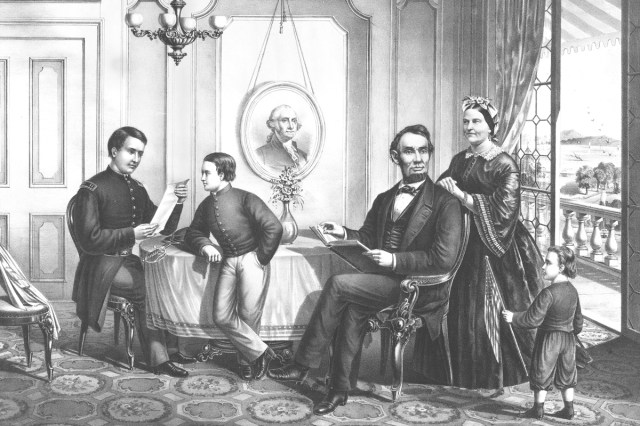
21. Abraham Lincoln’s only hobby was “cats,” according to his wife.
Few presidents had quite as much affection for their pets as Abraham Lincoln did for his cats, Tabby and Dixie. Many anecdotes from friends and colleagues speak to Lincoln’s unyielding affection for his feline friends, but the one that most cements his ailurophilia into history comes from his wife, Mary Todd. When asked if her husband had any hobbies, she had one simple reply: “Cats.”
22. Hollywood was established in Los Angeles to get away from Thomas Edison.
Hollywood most likely wouldn’t be the movie mecca it is today if not for filmmakers traveling west to escape Thomas Edison’s stranglehold on movie production. To ensure the success of his films, Edison formed an alliance with other industry patent holders to quash competition. But his influence was weaker in the West. This led some filmmakers to seek refuge in California, and many settled in a newly formed Los Angeles neighborhood called Hollywood.
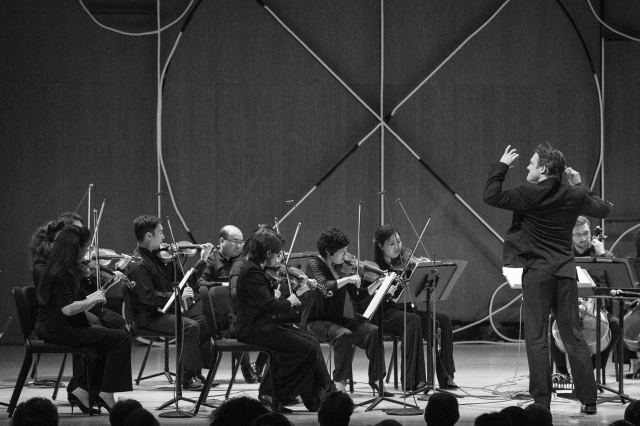
23. The New York Philharmonic once had to ask the audience not to knit during concerts.
There are few hobbies more perfectly aligned than knitting and listening to classical music. But in 1915, Americans took their zeal for needlework a bit too far, forcing the New York Philharmonic to request that its audience refrain from knitting during live musical performances. The clacking of needles in Carnegie Hall proved distracting to performers and audience members alike.
24. The planet Uranus was originally named “George’s star.”
In 1781, astronomer William Herschel discovered the planet we know today as Uranus, though the celestial orb nearly had a much more regal name. Herschel proposed naming the planet “Georgium Sidus” in honor of England’s King George III. However, the suggestion was met with pushback from other scientists, who noted that “George” didn’t quite mesh with the mythological names of the other planets.

25. Victorian England had special teacups for men with mustaches.
Life with a bushy upper lip wasn’t without its challenges in Victorian-era Britain, especially when it came to enjoying a hot cup of tea. Englishmen often used mustache wax to style their facial hair, which melted straight off their upper lip into the warm drink. Enter the “mustache cup,” which featured a built-in ceramic ledge for men to rest their mustaches against while they sipped their tea.
26. Cotton candy was invented by a dentist.
Cotton candy consists of just two simple ingredients: air and sugar, making it about the last thing a dental health professional would promote. Yet the sweet treat was invented by Tennessee dentist William James Morrison in 1897. He worked with a local candymaker to build what they called the “electric candy machine,” which produced a cloudlike confection they dubbed “Fairy Floss.”
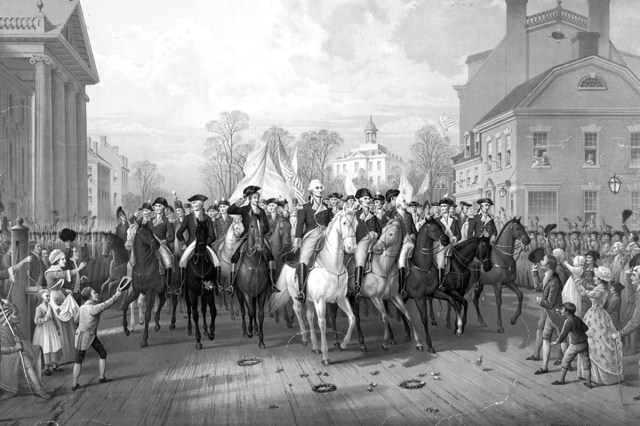
27. George Washington spent an entire campaign budget on booze.
The practice of winning over voters with food and booze used to be widespread, despite being technically illegal, and was known as “swilling the planters with bumbo.” During George Washington's second run for the Virginia House of Burgesses, he spent nearly the entire campaign budget on 160 gallons of rum, rum punch, wine, beer, and cider, served to 391 voters — roughly a half-gallon per voter.
28. The Roman Empire taxed urine.
In ancient Rome, you didn’t have to pay a tax to pee, but for a while, you did have to pay a tax to use urine commercially. The fluid is rich in ammonia, and aged urine could be used to clean clothes, dye fabrics, and more. Aware of its wide applications, one Roman emperor, Vespasian, even taxed the stuff. Vespasian, who was known for implementing and increasing taxes, went so far as to impose vectigal urinae (literally: urine tax) on public restrooms.
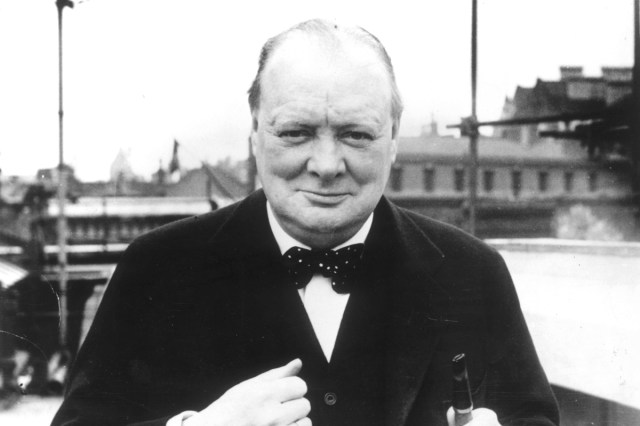
29. The first known use of “OMG” was in a letter to Winston Churchill.
The acronym “OMG” became popular as early internet lingo in the 1990s, but its first known use actually dates back to a letter written to Winston Churchill in 1917, during his time in the British navy. The letter was from First Sea Lord John Arbuthnot Fisher, who wrote, “I hear that a new order of Knighthood is on the tapis [table] — O.M.G. (Oh! My God!) — Shower it on the Admiralty!!”
30. A con artist “sold” the Eiffel Tower for scrap metal not once, but twice.
Victor Lustig is among the most skilled con artists in history. The notorious scammer even went so far as to convince someone to buy the Eiffel Tower — not once, but on two separate occasions. He assumed the identity of a government official and told several scrap metal dealers that the Eiffel Tower was too expensive to repair and would instead be sold for scrap to the higher bidder.
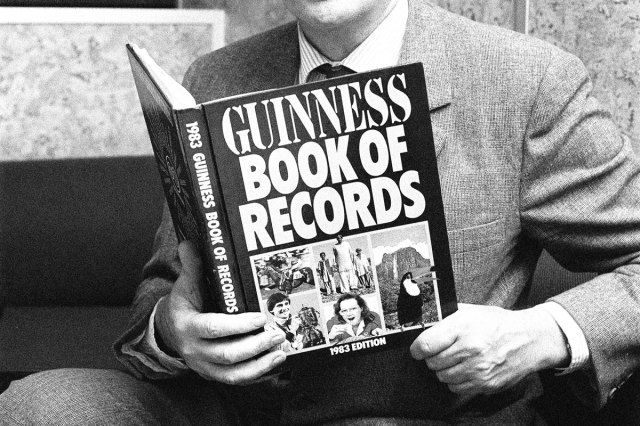
31. The Guinness Book of Records was created to settle arguments in pubs.
In 1954, Hugh Beaver of Guinness Brewery began compiling a record book to settle pub disputes, inspired by a hunting trip debate over the fastest game bird. Unable to find answers in existing reference works, he hired two researchers and began working on what became the Guinness Book of Records. It debuted in 1955 as a brewery promotion, and within a decade more than a million copies had been sold worldwide.
32. In 1835, a newspaper claimed life had been discovered on the moon.
In 1835, The New York Sun duped readers with the bizarre “Great Moon Hoax,” a series that claimed that life had been found on the moon, supposedly written by someone named Andrew Grant with the Edinburgh Journal of Science. It reported that using a giant telescope, astronomer John Herschel had discovered Earth-like landscapes, strange species such as single-horned goats and mini zebras, and even short, hairy humanoid bipeds with batlike wings.
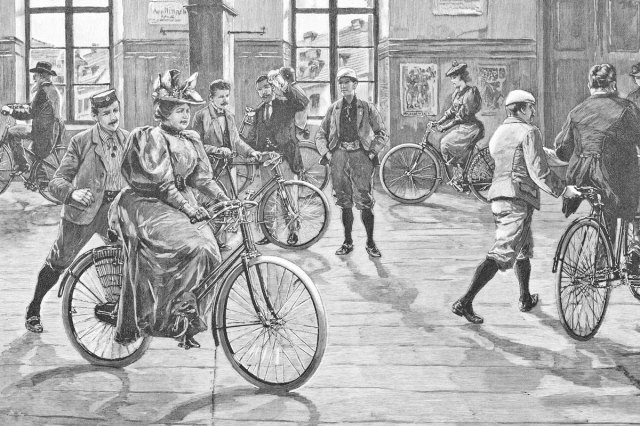
33. Doctors warned women of developing “bicycle face” from cycling in the 19th century.
The modern bicycle was invented in the 1880s, ushering in a bike craze in America. The popularity of cycling caused something of a moral panic — some doctors even claimed it could lead to a new condition called “bicycle face," which could include anything from a flushed and anxious look to a clenched jaw and bulging eyes. The crisis eventually subsided as the bicycle became more commonplace and hand-wringers turned their anxiety toward cars — and, naturally, “horseless carriage face.”
34. Jimmy Carter was once attacked by a “swamp rabbit.”
During one Georgia vacation in 1979, President Jimmy Carter was relaxing on a boat in a pond when what has since become known as the “killer rabbit attack” occurred. The swamp rabbit in question, which, according to The New York Times, was said to be “hissing menacingly, its teeth flashing and its nostrils flared,” swam toward the president until he shooed it away with his paddle. As unbelievable as the incident might sound, it was photographed for posterity.
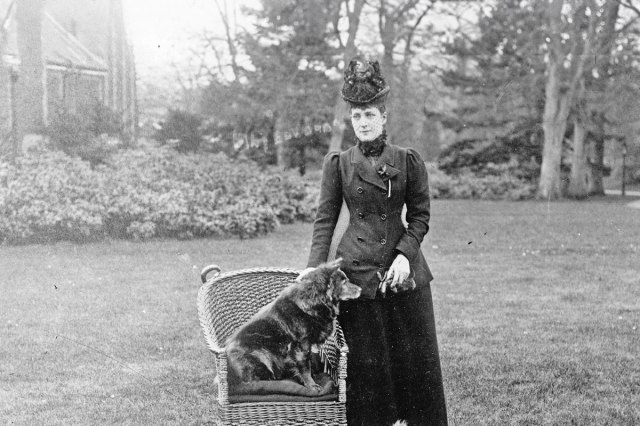
35. Limping was a fad in Victorian England.
In Victorian-era Britain, few fashion icons were as influential as Alexandra, Princess of Wales. When a fever left her with a stiff knee and pronounced limp, high-society ladies were so eager to imitate her that they even adopted her gait. At first, imitators wore mismatched shoes to get the walk, but eventually retailers took notice and started stocking pairs of shoes with two different heel heights to capitalize on the trend.
36. There’s an old Irish Festival that crowns a goat king each year.
Some small towns have animal mayors, but what about animal monarchs? Killorglin, Ireland, has one: a goat king it crowns in a festival every year. The Puck Fair is held each August and attracts visitors from near and far hoping to take part in the royal caprine festivities. On day one, a wild male goat found in the nearby wilderness is crowned for the duration of the festival by Queen Puck, a young girl from the town.
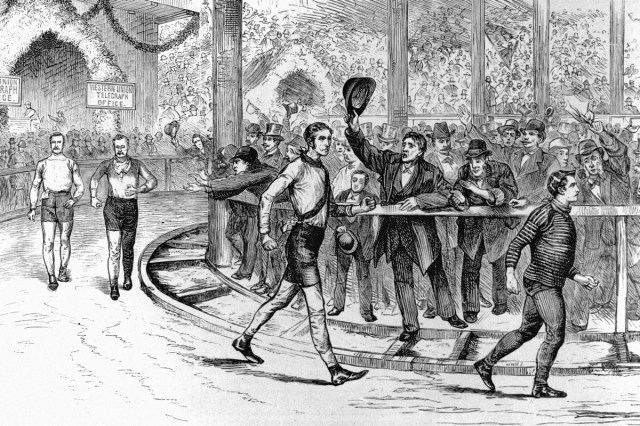
37. Walking was a competitive sport in the 19th century.
On March 10, 1879, a New York City arena was absolutely packed with screaming fans of America’s latest sports craze: pedestrianism. That day marked the start of the Astley Belt, essentially the Super Bowl of walking. Contestants had to circle the 1/8-mile track for six days straight and reach a distance of at least 450 miles. The sport was so popular it even spawned America’s first celebrity athletes, complete with trading cards and brand endorsement deals.
38. Europeans feared tomatoes for centuries, believing they were poisonous.
There’s a reason why the humble tomato used to be known by the far more sinister moniker of “poison apple”: Europeans feared tomatoes for centuries and believed they were poisonous. As recently as the 18th century, it was thought that aristocrats were falling ill and even dying after eating tomatoes — a misconception stemming from the use of pewter plates tomatoes were served on, which contained high lead content.
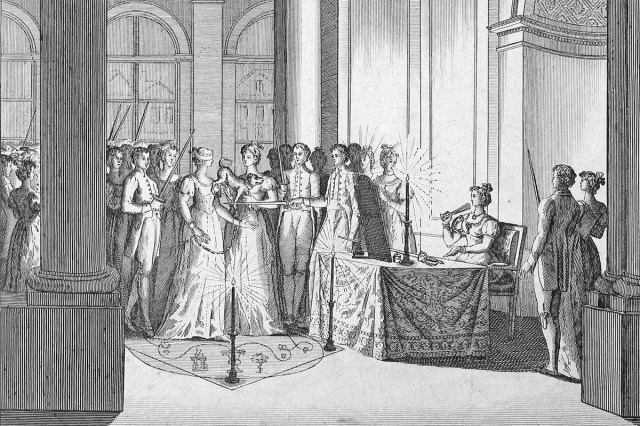
39. There was a secret Catholic society called the Order of the Pug.
In 1738, the pope banned Catholics from participating in secret societies. In response, one Catholic leader established a para-Masonic society called the Order of the Pug, a reference to the breed’s qualities of loyalty and steadfastness. Members were known as “Mops” and each lodge had a Grand Pug. Prospective members were expected to mimic dogs by scratching at the door to gain entry, and new initiates were adorned with brass collars while fellow members barked at them.
40. In the 1930s, a skyscraper was rotated 90 degrees while everyone kept working inside.
When the Indiana Bell Telephone Company purchased the Central Union Telephone Company in 1929, rather than raze the existing eight-story headquarters, it decided to move the building across the lot — 52 feet sideways, followed by a 90-degree turn. Not only did the plan work, but the offices remained fully operational during the move. The building traveled roughly 15 inches per hour, and reportedly, the workers inside didn’t even feel the movement.
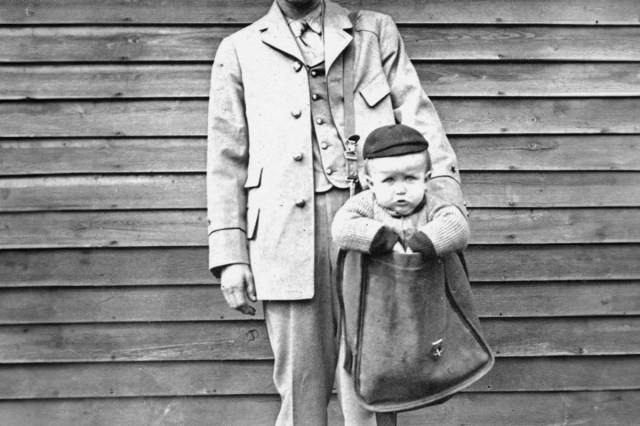
41. People used to send their children through the U.S. mail.
In 1913, the United States Post Office began offering parcel service, and Americans started shipping pretty much anything they could think of — including their children. The first recorded baby delivered via parcel post was James Beagle, an 8-month-old resident of Glen Este, Ohio. He was delivered to his grandmother just a few miles away; the postage cost 15 cents, and his parents insured him for $50.
42. Emperor Hirohito was buried wearing a Mickey Mouse watch.
You might be a Disney adult, but if you’re not planning to be buried with a Mickey Mouse accessory, it would appear you’re less of a fan than Japanese Emperor Hirohito, who was interred wearing his Mickey watch. The monarch, who reigned over Japan from 1926 to 1989, first visited Disney in 1975 after being a longtime fan of the cartoons. It was then that he was given the watch, which he was evidently quite taken by.
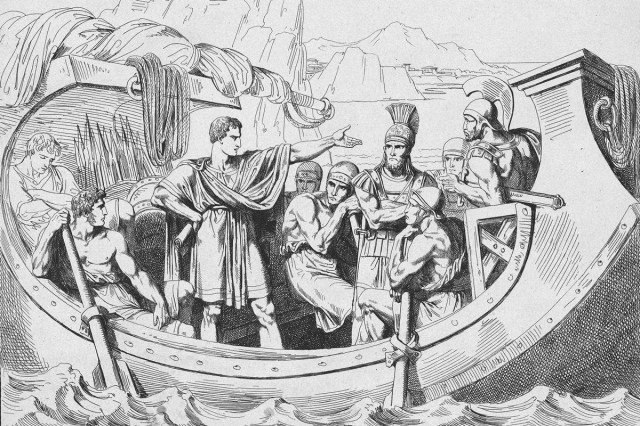
43. Julius Caesar was once kidnapped by pirates.
Long before he ruled Rome, Julius Caesar was kidnapped by pirates around 75 BCE. He reportedly laughed when he heard that his ransom was set at a mere 20 talents of silver (a huge sum of money) and suggested it be raised. He then proceeded to boss around his captors: He forced them to listen to his poems and speeches, ordered them to keep quiet when he slept, and announced — correctly — that they would all be executed once he was free.
44. The baby boom caused a nationwide diaper shortage.
At the end of World War II, ration restrictions were lifted, but the U.S. still found itself in short supply of a crucial item: diapers. The country was in the nascent stages of a postwar baby boom, and as the young population surged with soldiers returning home and starting families, cloth diaper production remained slow. The diaper shortage made headlines across the country for years, but by 1947, mention of it had tapered off.
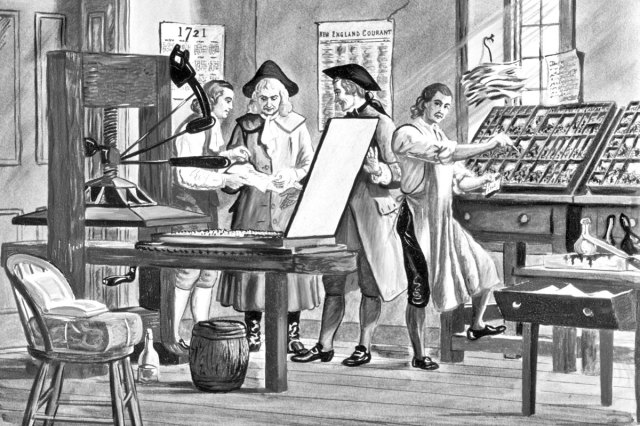
45. Ben Franklin wrote essays for his brother’s newspaper as a widow named “Silence Dogood.”
Among all the Founding Fathers, Benjamin Franklin had the most interesting extracurricular activities, including writing essays for his brother’s Boston newspaper under the pseudonym “Silence Dogood.” The 16-year-old Franklin posed as a widow because the writing he submitted under his own name was rejected by the paper. Silence had much to say about a variety of subjects, and she was an instant hit with readers — she even received marriage proposals.
46. Some airplanes used to have dance floors.
The groovy ’70s saw airlines go all out with attempts to please customers aboard their brand-new Boeing 747 jumbo jets. Case in point: Air Canada turned the upper deck of its 747 into a 5-mile-high club for transatlantic flights, with music blasting from 8-track tapes as passengers shimmied on a dance floor in lockstep with their reflections on a mirrored wall. Other airlines followed suit, but sadly, this era of the party plane was short-lived.

47. The founder of Fender didn't know how to play guitar.
Just because Leo Fender founded one of the most famous guitar companies in the world doesn’t mean he could play the instrument himself. His own musical ability didn’t extend beyond a few piano lessons and a little bit of saxophone; according to some, he couldn’t even tune a guitar. Rather, his prowess for creating instruments was rooted in a passion for electronics.
48. Welsh soldiers are said to have worn leeks in battle.
Leeks, of all things, have long been a national emblem of Wales. According to one prevailing theory, the symbol began back in the seventh century, when Welsh soldiers were ordered to pull leeks from the ground and affix them to their helmets during a battle against Saxon invaders, to easily differentiate them from their enemies. The leafy vegetable became a point of national pride, and the connection was even referenced in Shakespeare’s Henry V.
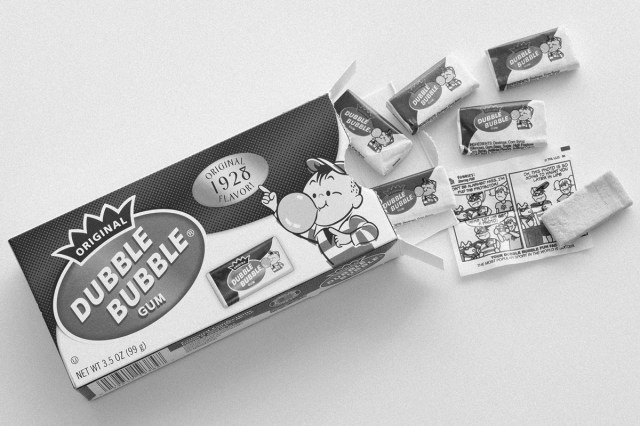
49. Bubble gum is pink because it was the only dye the inventor had on hand.
Bubble gum was invented in 1928 by candymaker Walter Diemer. He came up with a more pliable chewing gum that, for the first time, could easily form and hold a bubble. The idea was appealing, but the chewy gray substance needed some color, and the only dye Diemer had on hand at the time was red. With no other choice, he added it to his mixture, and the first batch of pink bubble gum was born.
50. The “L.A. Times” spoiled all of the winners of the 12th Academy Awards.
The internet may have made spoilers more common, but it certainly didn’t invent them. Back in 1940, for instance, the Los Angeles Times accidentally revealed the winners of the 12th Academy Awards by publishing them before the end of the event. As the 8:45 p.m. edition of the L.A. Times came out before the ceremony concluded, the news spread that Gone With the Wind had won Best Picture before it was officially announced. Following the early reveal, the academy stopped giving out the winners early and started the sealed-envelope tradition that continues to this day.





